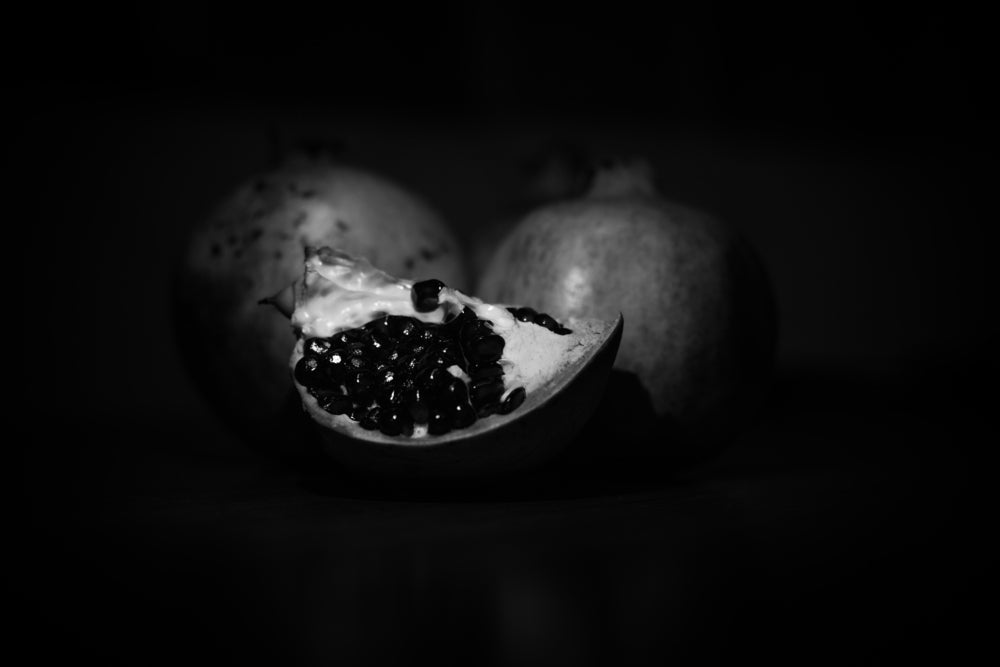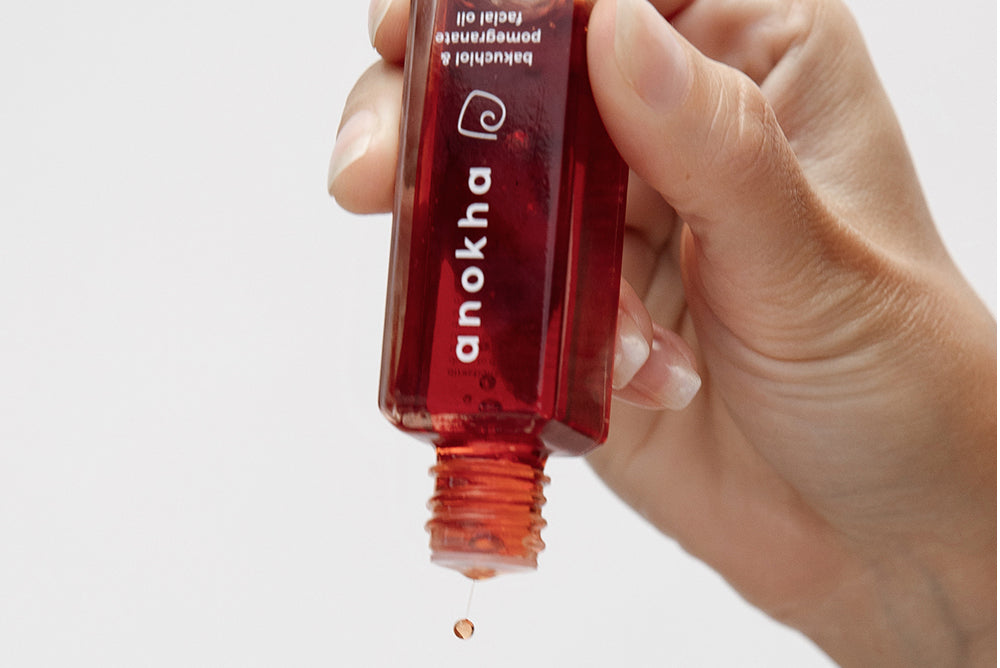
ingredient focus: pomegranate

the bottom line
From ancient Egypt to modern times, the pomegranate has been worshipped as a symbol of fertility and prosperity. Used as a natural remedy for over 3000 years, the pomegranate has re-emerged as the ultimate superfood for the skin. One look at the hundreds of glistening crimson seeds inside each pomegranate, and it’s no wonder why people are keen to incorporate this beautiful fruit into their skincare routine. Hungry for more? Keep reading.
first layer: the history
Shrouded in centuries of folklore, the pomegranate is one of the most revered fruits in existence. Tales of pomegranates, whether they are found in Greek myths, Biblical texts, or ancient manuscripts, are spread throughout the world. Few countries have evolved without at least a passing reference to this exotic and delicious fruit.
It is believed that the pomegranate was one of the first cultivated fruits. Most scholars support the belief that the pomegranate was native to Iran and the Himalayas in Northern India, then cultivated over the whole Mediterranean region of Asia, Africa and Europe, migrating to the Far East and China. The fruit has also acquired symbolic status, with the ancient Egyptians regarding it as a symbol of prosperity and ambition. Today, the Greeks still prize it as a carrier of abundance, fertility, and good luck. But regardless of when or where the pomegranate was first encountered, almost all cultures have enjoyed its tart, jeweled seeds.
second layer: the science
Pomegranate seed oil obtained from the fruit has is known for its very high concentration of punicic acid, a powerful anti-inflammatory and anti-oxidant*. Pomegranate extract itself contains high levels of ellagic acid, which has both anti-inflammatory and antioxidant properties, and has been shown to speed wound healing and even protect the skin from sun-damage. Another one of its compounds, catechin*, lends anti-microbial and anti-viral superpowers to this magnificent fruit, while its high level of vitamin C helps to brighten skin and even out tone.
third layer: pomegranates in skincare
What’s the best way to use this wonder fruit? As always, you have options. Purchase the oil in its pure form and add a few drops to your evening moisturizer. Because it’s a slow-drying oil, your skin will be able to absorb the moisture with even a small amount. Or, choose a superfood masque that incorporates both its color and benefits. Look for it in cleansers and lotions; this little hero is popping up everywhere right now. And don’t forget the fruit itself – oral ingestion is the fastest way to reap the pomegranate’s rewards. Some specific benefits of the pomegranate fruit for skincare include the following:
- anti-aging: antioxidants within pomegranates help to fight free radicals, which can damage skin cells and contribute to premature aging. pomegranates also help to stimulate the production of collagen and elastin, which in turn reduces the appearance of fine lines and wrinkles.
- hydration: pomegranate oil penetrates deeply into the skin to assist with hydration and the prevention of moisture loss.
- skin brightening: pomegranate brightens the skin and evens skin tone by reducing hyperpigmentation.
- anti-inflammatory: the anti-inflammatory properties of pomegranate help to soothe irritation, including that found with acne and eczema.
- anti-acne: pomegranate's antimicrobial and antibacterial properties may help with the reduction of acne.
fourth layer: how we do it
anokha’s rice bran & pomegranate facial cleansing oil is a replenishing cleansing oil with rice bran, pomegranate, and castor seed oil to remove makeup, sunscreen, sebum, and sweat. our bakuchiol & pomegranate facial oil is a luxurious facial oil that winds back wrinkles, with natural retinol alternative bakuchiol.
All this and more at www.anokhaskincare.com .
xx
anokha
references:
1https://en.wikipedia.org/wiki/Pomegranate
2 Shabbir MA, Khan MR, Saeed M, Pasha I, Khalil AA, Siraj N N. Punicic acid: A striking health substance to combat metabolic syndromes in humans. Lipids Health Dis. 2017; 16: 99.
3 Afaq F, Zaid MA, Khan N, Dreher M, Mukhtar H. Protective effect of pomegranate-derived products on UVB-mediated damage in human reconstituted skin. Exp Dermatol. 2009 Jun;18(6):553-61.
*definitions:
antioxidant: an antioxidant is a compound that inhibits oxidation. free radicals create oxidative stress and an inflammatory response which in turn can damage DNA and result in injury to the epidermal and dermal layers of the skin. in the skin, this manifests as premature aging with decreased elasticity leading to increased wrinkling, age spots, and decreased skin tone. antioxidants stabilize free radicals, which in turn limits their ability to damage the body.
catechin: catechins are a type of antioxidant found in plants that may help prevent and treat diseases. they are a class of flavonoid called flavanols. some catechins include epigallocatechin gallate (EGCG), gallocatechin gallate, gallocatechin, catechin, epicatechin, epicatechin gallate, and epigallocatechin.
faq's:
what are the main benefits of pomegranates?
pomegranate offers numerous health benefits, including anti-inflammatory and antioxidant properties.
how does the pomegranate help with skin care?
pomegranate's benefits for skin include anti-aging, hydration, skin brightening, and anti-acne treatment.



leave us a comment
This site is protected by hCaptcha and the hCaptcha Privacy Policy and Terms of Service apply.